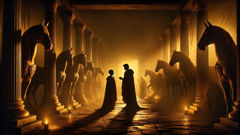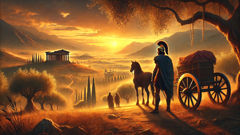Introduction
In the heart of ancient Greece, where olive groves swept across gentle hills and the air shimmered with the promise of heroism, a tale of courage and destiny unfolded—one that would ripple through time to shape the spirit of competition and athletic glory. The land was alive with stories: of gods and mortals, of love entwined with risk, and of kings both just and vengeful. But among these legends, the story of Pelops stood out, not just for its drama but for the shadow it cast over the very soil where athletes would one day gather in friendly rivalry. At the crossroads of myth and history, Pelops, a young man marked by divine parentage and mortal ambition, arrived in the kingdom of Pisa. Here, he sought more than a princess’s hand; he sought to claim his own fate. The challenge was infamous: King Oenomaus, Hippodamia’s father, would not easily relinquish his beloved daughter. He had been warned—by oracles and by dreams—that a suitor would one day bring about his doom. Thus, he devised a cruel contest: a chariot race, in which the prize was Hippodamia and the penalty for failure was death. Many had tried. All had failed. The bones of the defeated suitors lined the path to Oenomaus’s palace, bleached white in the relentless sun, a chilling warning to those who dared pursue love without cunning or luck. Pelops, undeterred, stood before these grim reminders and resolved that he would not add his own bones to the king’s collection. Yet the race was no ordinary test of speed. Oenomaus possessed divine horses gifted by Ares, said to be swifter than the North Wind itself. His charioteer, Myrtilus, was rumored to be both loyal and devious, a man who understood the secret mechanisms of the king’s chariot. And so, Pelops knew that brawn alone would never be enough. As the sun set behind the sacred groves of Olympia, casting long shadows across the land, Pelops prayed to Poseidon, his immortal patron and former lover, begging for favor and a means to turn the impossible into the inevitable. The gods, ever watchful, whispered among themselves, uncertain whether to grant him victory or doom. What unfolded next would become legend—a race where treachery, love, and fate collided, giving birth to both triumph and tragedy, and setting the stage for the creation of the Olympic Games. Through winding forests, thunderous chariots, and desperate bargains, the myth of Pelops endures, reminding us that every contest holds within it the power to change the world.
The Shadow of a Curse
Before Pelops ever set foot in Pisa, his name was already whispered among mortals and immortals alike. He was not just any suitor—he was the son of Tantalus, a king once favored by the gods, whose own story was woven with hubris and horror. Tantalus had invited the Olympians to a banquet and, in a moment of madness, served them the flesh of his own son, Pelops, to test their omniscience. The gods recoiled in outrage, sparing only Demeter, who, distracted by her search for Persephone, unknowingly tasted a piece of Pelops’s shoulder. The gods restored Pelops to life, fitting him with an ivory shoulder crafted by Hephaestus. Thus, Pelops returned to the world of the living marked by both miracle and curse.

Though Tantalus was banished to eternal torment, Pelops grew into a youth both beautiful and ambitious, his destiny forever shadowed by his father’s transgressions. He found favor with Poseidon, god of the sea, who took Pelops as his beloved companion and gifted him with a golden chariot drawn by winged horses. Yet even divine favor could not erase the darkness that clung to his bloodline. It was this blend of privilege and peril that set Pelops on the road to Pisa, where another curse awaited—a curse bound not to him, but to the house of Oenomaus.
King Oenomaus ruled his land with a heavy heart and a jealous love for his daughter, Hippodamia. From the day of her birth, oracles warned that he would be killed by his son-in-law. To thwart fate, Oenomaus devised a challenge that was as much a death sentence as a contest: any suitor wishing to marry Hippodamia must first defeat the king in a chariot race from Pisa to the altar of Poseidon at Corinth. Oenomaus’s horses, gifts from Ares, were untiring and unmatched. The king himself was a master of war and speed. And Myrtilus, his charioteer, knew every stone and rut of the track, every trick to ensure the king’s victory. With each failed attempt, another skull adorned Oenomaus’s palace gates—a mute testament to love’s dangers.
Hippodamia, beautiful and clever, grew ever more despondent as one suitor after another met their end. She longed for freedom, for the embrace of someone who would not perish before her eyes. When Pelops arrived, radiant as the dawn and exuding quiet confidence, hope flickered in her heart. She saw in him not just another victim, but perhaps a deliverer—one who might break both her father’s curse and her own captivity.
The night before the race, with the stars scattered like spilled pearls over Olympia’s hills, Pelops slipped into the shadows near the king’s stables. Hippodamia awaited him, her eyes bright with fear and resolve. She told him of the curse, of her father’s divine horses, of Myrtilus’s cunning. She offered him a desperate bargain: if he could win, she would be his, but if he lost, she would be left to mourn again. Pelops confessed his own uncertainties. The task seemed impossible, even with his winged horses. But Hippodamia revealed another way: she could convince Myrtilus to betray Oenomaus. In exchange for his help, Myrtilus would demand a reward—a night with Hippodamia herself. The price was steep, but in the desperate calculus of survival, Pelops agreed.
That night, Myrtilus crept to Hippodamia’s chamber. She made her plea and offered her promise. Swayed by love or lust or a hatred for the king he served, Myrtilus consented. Together, they conspired to sabotage Oenomaus’s chariot: Myrtilus would replace the bronze linchpins with ones made of wax. When the race reached its most perilous point, the heat and friction would cause the wax to melt and the wheels to collapse. The plot was set in motion, and as dawn approached, each conspirator lay awake, haunted by dread and hope.
The Race for Love and Destiny
The day of the race dawned with the air thick and heavy, as if Olympus itself was holding its breath. The people of Pisa crowded the edges of the starting field, their eyes drawn not to the grim king but to the youth whose resolve seemed to burn brighter than the rising sun. Pelops wore a garland of laurel in his dark hair, a symbol of hope and sacrifice, while Oenomaus stood tall and severe, his armor gleaming with an unearthly sheen. Hippodamia, veiled and silent, watched from a balcony above, her heart pounding with every drumbeat that marked the hours before the contest.

Oenomaus strode to his chariot, drawn by horses that seemed restless for blood. Myrtilus, betrayer and accomplice, moved quietly among the wheels, giving no sign of his treachery. Pelops stood beside his own chariot, the golden frame glinting in the morning light. His horses, gifts from Poseidon, stamped and snorted, their wings folded against their sides, straining for release. The tension was so great that even the birds fell silent.
With a thunderous shout, Oenomaus signaled the start. The chariots surged forward in a spray of dust and flying hooves. At first, the king took the lead easily—his horses were born of gods and seemed to devour the distance. Pelops followed close behind, holding his team in check, waiting for the fateful moment when Myrtilus’s trick would come into play. The course wound through forests and over stony hills, past shrines dedicated to long-forgotten gods. The crowd’s cheers faded into the distance as the two chariots thundered into wild country.
Oenomaus glanced back, his face twisted with a mixture of rage and fear. He had killed so many suitors; he had never doubted his own invincibility. But Pelops, with his divine chariot and steady hands, gained ground with every stride. Hippodamia’s prayers rode on the wind as she watched for any sign of disaster or hope.
The halfway mark loomed—a dangerous curve skirting a rocky ravine. Here, Myrtilus’s betrayal would be revealed. As Oenomaus whipped his horses to greater speed, the wax linchpins began to melt. Suddenly, with a terrible screech, a wheel broke loose from the king’s chariot. Oenomaus fought to regain control, but the chariot toppled and crashed in a tangle of limbs and splintered wood. The horses bolted into the wilds as Oenomaus lay crushed beneath his own pride and destiny.
Pelops reined in his team and leapt from his chariot. He approached the fallen king with caution. Oenomaus, broken but not yet dead, locked eyes with his conqueror. With his dying breath, he cursed Pelops and his descendants, vowing that their victories would forever be stained by betrayal and blood. As Oenomaus’s spirit fled to Hades, the land itself seemed to shudder—the first drop of a tragedy that would haunt Pelops’s lineage for generations.
Pelops returned to Pisa in triumph. The people cheered; Hippodamia ran to his arms. Their wedding was celebrated with feasts and games, and the land rejoiced at the end of Oenomaus’s tyranny. Yet amid the joy, shadows lingered. Myrtilus came to claim his promised reward. But Hippodamia recoiled in horror, and Pelops, filled with guilt and rage, refused to honor the pact. In a fit of desperation or perhaps justice, Pelops seized Myrtilus and cast him from a cliff into the surging sea below. As he fell, Myrtilus cursed Pelops in turn, swearing that his descendants would suffer endless misfortune.
Thus, joy and sorrow were forever bound together in Pelops’s victory. The curse of Oenomaus and Myrtilus echoed through generations, giving rise to tales of murder, revenge, and sorrow—the tragedies of Atreus, Thyestes, Agamemnon, and Orestes. Yet in that moment, as Pelops embraced Hippodamia and the people hailed their new king, the world seemed bright with possibility. To honor both the fallen king and the victor’s courage, great games were established at Olympia: contests of speed, strength, and skill where mortals could strive for glory beneath the gaze of the gods. Thus, from love and loss, from courage and cunning, the spirit of the Olympic Games was born.
Conclusion
The legend of Pelops and the chariot race endures not merely as an echo of ancient ambition, but as a reminder that every triumph carries a shadow—every victory leaves its mark on those who win and those who lose. The story’s legacy lived on in Olympia’s sacred games, where athletes from every corner of Greece gathered in peace to test their limits and honor both gods and mortals. In the groves where Pelops once prayed and raced, olive wreaths were bestowed upon champions, their sweat and courage sanctified by memory. The curse that haunted Pelops’s line became a warning about pride and betrayal, yet his daring—his willingness to risk everything for love—remained an enduring inspiration. To this day, the spirit of Pelops rides on in every contest where heart and destiny meet, urging us to strive, to dream, and to remember that history is shaped by those bold enough to race toward the unknown.













